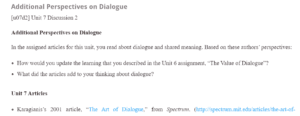Additional Perspectives on Dialogue
Previous lessons on dialogue show that it is undoubtedly a valuable addition to organizational development initiatives. The additional perspectives reaffirm this lesson. They show that dialogue enables better learning, thus facilitating more effective organizational development. Drybrough and Godin (2014) provide a simple definition of dialogue that enhances the comprehension of this level of communication. The article defines dialogue as communication with each other, not at each other. When in dialogue, people are not concerned about sharing information as much as they are interested in learning. Dialogue facilitates better collaboration, which Senge et al. (2007) believe is important for organizational change. Collaboration, through dialogue, creates an environment of learning. It enables group members to focus on complex issues as a team. They work together to develop solutions rather than trying to fulfill individual goals.
In general, the two additional perspectives on dialogue confirm what was already learned about the value of dialogue. The article further explains why it is important for an organization to achieve this level of engagement. Getting employees to genuinely want to be in dialogue is not an easy process, but the understanding of its value should be enough to convince organizations to try and achieve it. Drybrough and Godin (2014) mention organizations’ strategies to achieve dialogue communication. These strategies include using balanced inquiry and advocacy, understanding concepts, understanding intent vs. impact, and building a container for conversation. Leaders can follow these rules to create better collaborative relationships.
References
Drybrough, J. & Goddin, D. (2014). Dialogue. Training Journal
Senge, P. M., Lichtenstein, B. B., Kaeufer, K., Bradbury, H., & Carroll, J. S. (2007). Collaborating for systemic change. MIT Sloan Management Review, 48(2), 44.
ORDER A PLAGIARISM-FREE PAPER HERE
We’ll write everything from scratch
Question
Additional Perspectives on Dialogue
[u07d2] Unit 7 Discussion 2
Additional Perspectives on Dialogue
In the assigned articles for this unit, you read about dialogue and shared meaning. Based on these authors’ perspectives:

Additional Perspectives on Dialogue
- How would you update the learning that you described in the Unit 6 assignment, “The Value of Dialogue”?
- What did the articles add to your thinking about dialogue?
Unit 7 Articles
- Karagianis’s 2001 article, “The Art of Dialogue,” from Spectrum. (http://spectrum.mit.edu/articles/the-art-of-dialogue/)
- Williams’s “William N. Isaacs’ Take on Dialogue.” (http://www.soapboxorations.com/ddigest/isaacs.html)
- The Presencing Institute’s 2011 “Dialogue on Leadership.” (https://www.presencing.com/presencing/dol)
- Discussion Participation Scoring Guide.
Discussion Participation Scoring Guide. DISCUSSION PARTICIPATION SCORING GUIDE
Due Date: Weekly.
Percentage of Course Grade: 30%.
| DISCUSSION PARTICIPATION GRADING RUBRIC | ||||
| Criteria | Non-performance | Basic | Proficient | Distinguished |
| Applies relevant course concepts, theories, or materials correctly. | Does not explain relevant course concepts, theories, or materials. | Explains relevant course concepts, theories, or materials. | Applies relevant course concepts, theories, or materials correctly. | Analyzes course concepts, theories, or materials correctly, using examples or supporting evidence. |
| Collaborates with fellow learners, relating the discussion to relevant course concepts. | Does not collaborate with fellow learners. | Collaborates with fellow learners without relating discussion to the relevant course concepts. | Collaborates with fellow learners, relating the discussion to relevant course concepts. | Collaborates with fellow learners, relating the discussion to relevant course concepts and extending the dialogue. |
| Applies relevant professional, personal, or other real-world experiences. | Does not contribute professional, personal, or other real-world experiences. | Contributes professional, personal, or other real-world experiences, but lacks relevance. | Applies relevant professional, personal, or other real-world experiences. | Applies relevant professional, personal, or other real-world experiences to extend the dialogue. |

